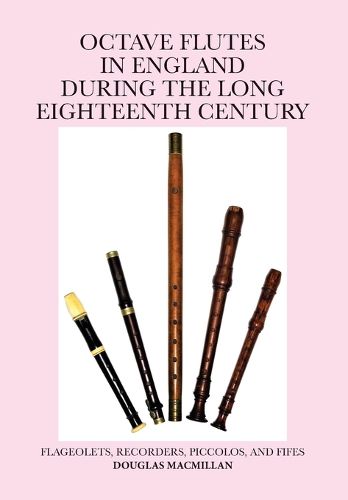Readings Newsletter
Become a Readings Member to make your shopping experience even easier.
Sign in or sign up for free!
You’re not far away from qualifying for FREE standard shipping within Australia
You’ve qualified for FREE standard shipping within Australia
The cart is loading…






This title is printed to order. This book may have been self-published. If so, we cannot guarantee the quality of the content. In the main most books will have gone through the editing process however some may not. We therefore suggest that you be aware of this before ordering this book. If in doubt check either the author or publisher’s details as we are unable to accept any returns unless they are faulty. Please contact us if you have any questions.
'Octave flutes' are deemed to be those whose lowest note lies about an octave above middle C and for the purposes of this book, the 'long eighteenth century' runs from the Restoration of the English Monarchy in 1660 to the Battle of Waterloo in 1815. This date range allows a study not only of octave recorders but also of the flageolet and the emergence of the piccolo as the eighteenth century gave way to the nineteenth: at this time, too, the flageolet enjoyed something of a renaissance. For good measure, the fife - an instrument with a longer continuous history than the recorder, flageolet, or piccolo - is included. Chapters will outline the history, organology, and repertoire of the flageolet, the small recorders, the piccolo, and the fife, and will place the instruments in both musical and social contexts in England in the long eighteenth century. As befits the most popular - and musically most significant - octave flute in England between 1660 and 1815, pride of place will be given to the English 'little flutes', known to us today as soprano and sopranino recorders.
Douglas MacMillan is an organologist, music historian, and recorder player living in Guildford, England. He is an independent scholar, holding doctoral degrees from the University of Oxford, the Royal College of Music, and the University of Surrey. Douglas has contributed extensively to the literature on the recorder in the nineteenth century, the English flageolet, on octave recorders, and the English small flute concertos.
$9.00 standard shipping within Australia
FREE standard shipping within Australia for orders over $100.00
Express & International shipping calculated at checkout
This title is printed to order. This book may have been self-published. If so, we cannot guarantee the quality of the content. In the main most books will have gone through the editing process however some may not. We therefore suggest that you be aware of this before ordering this book. If in doubt check either the author or publisher’s details as we are unable to accept any returns unless they are faulty. Please contact us if you have any questions.
'Octave flutes' are deemed to be those whose lowest note lies about an octave above middle C and for the purposes of this book, the 'long eighteenth century' runs from the Restoration of the English Monarchy in 1660 to the Battle of Waterloo in 1815. This date range allows a study not only of octave recorders but also of the flageolet and the emergence of the piccolo as the eighteenth century gave way to the nineteenth: at this time, too, the flageolet enjoyed something of a renaissance. For good measure, the fife - an instrument with a longer continuous history than the recorder, flageolet, or piccolo - is included. Chapters will outline the history, organology, and repertoire of the flageolet, the small recorders, the piccolo, and the fife, and will place the instruments in both musical and social contexts in England in the long eighteenth century. As befits the most popular - and musically most significant - octave flute in England between 1660 and 1815, pride of place will be given to the English 'little flutes', known to us today as soprano and sopranino recorders.
Douglas MacMillan is an organologist, music historian, and recorder player living in Guildford, England. He is an independent scholar, holding doctoral degrees from the University of Oxford, the Royal College of Music, and the University of Surrey. Douglas has contributed extensively to the literature on the recorder in the nineteenth century, the English flageolet, on octave recorders, and the English small flute concertos.